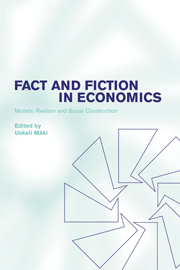Book contents
- Frontmatter
- Contents
- Notes on the contributors
- Preface
- I Introduction
- II Setting the scene
- III Economic models and economic reality
- 5 Credible worlds: the status of theoretical models in economics
- 6 The limits of causal order, from economics to physics
- 7 Econometrics and reality
- 8 Models, stories, and the economic world
- 9 Economic models and reality: the role of informal scientific methods
- 10 Truthlikeness and economic theories
- IV The constitution of economic reality
- V The institutions of economics
- Index
- References
7 - Econometrics and reality
Published online by Cambridge University Press: 22 September 2009
- Frontmatter
- Contents
- Notes on the contributors
- Preface
- I Introduction
- II Setting the scene
- III Economic models and economic reality
- 5 Credible worlds: the status of theoretical models in economics
- 6 The limits of causal order, from economics to physics
- 7 Econometrics and reality
- 8 Models, stories, and the economic world
- 9 Economic models and reality: the role of informal scientific methods
- 10 Truthlikeness and economic theories
- IV The constitution of economic reality
- V The institutions of economics
- Index
- References
Summary
Econometrics and reality
Is econometrics possible? The question reminds me of an argument between two divines at an ecumenical conference. Baptist minister: “I don't believe in infant baptism.” Roman Catholic archbishop: “Not only do I believe in infant baptism, I have seen it done.” Every applied economist has seen it done; yet Tony Lawson in his book, Economics and Reality (1997), assures us that, splash the econometric holy water as you may, economic heaven will not be a whit closer. The metaphor is perfectly apt; for Lawson's reason for dismissing econometrics is metaphysical: transcendental realism provides an accurate ontology of the economic world; econometrics is necessarily incompatible with transcendental realism. Nancy Cartwright, who is also a realist, appears more favorably disposed to econometrics. After all, in her Nature's Capacities and Their Measurement (1989), she stokes the self-esteem of economists by suggesting that quantum physicists might learn a thing or two about handling probabilities from econometricians (see also chapter 6 in this volume). Beneath a cheery exterior, her views are in fact stunningly pessimistic: the conditions in which econometric methods can succeed are strict; they may be met in the land of quantum physics, but never in their country of origin. Against both Lawson and Cartwright, I maintain that econometrics and realism are compatible and, indeed, that realism helps us better to understand the role and successes of econometrics.
- Type
- Chapter
- Information
- Fact and Fiction in EconomicsModels, Realism and Social Construction, pp. 152 - 177Publisher: Cambridge University PressPrint publication year: 2002
References
- 15
- Cited by



